#trump airlines
Explore tagged Tumblr posts
Text
That's not entirely accurate.
He didn't bankrupt a casino. He bankrupted three casinos

#half of his bankruptcies were casinos#all of the businesses he started himself failed#trump airlines#trump steaks#trump magazine
180 notes
·
View notes
Text


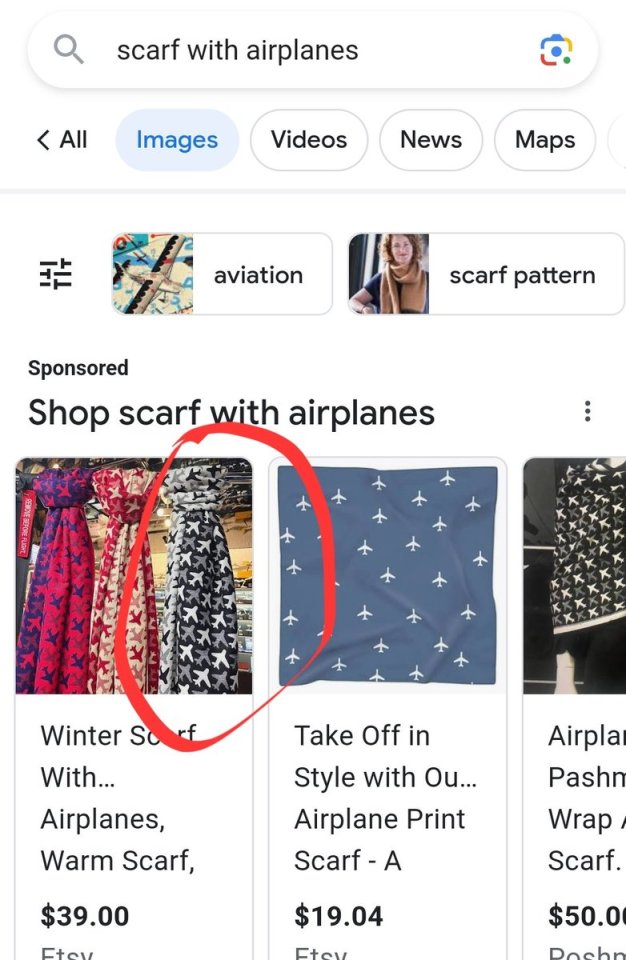
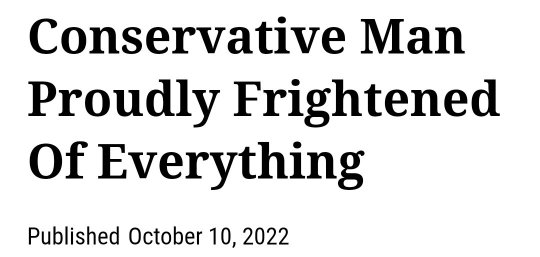
#News#palestine#democrats#republicans#poc#woc#blm#books#donald trump#fashion#unitard airlines#muslims#islamphobia#scarves#twitter
4K notes
·
View notes
Text

#trump#donald trump#trump 2024#democrats#president trump#movie star#libs#liberals#donald j. trump#usa news#usa politics#usa#america#merica#newsmax#fox news#oann#jesse watters#greg gutfeld#kid rock#elon musk#socialist politics#socialist party#maga 2024#make america great again#true patriot#patriotic#patriotism#airlines#pride
528 notes
·
View notes
Text
44 notes
·
View notes
Text

11/9/2024: Ode to the Trump/ Project 25 disaster coming soon
#journaling#writing#survive and thrive 25#9/11/2001 Trade Towers#Pentagon#4 US airliners high jacked#Trump Wins#11/9/2024
10 notes
·
View notes
Text
#Donald Trump#Hate Group#Southwest Airlines#The Alliance Defending Freedom#The Southern Poverty Law Center#News
5 notes
·
View notes
Text
BREAKING: Spirit, the biggest U.S. budget airline, said that it has filed for bankruptcy protection and will attempt to reboot as it struggles to recover from the pandemic-caused swoon in travel and a failed attempt to sell the airline to JetBlue.

0 notes
Text
More Memes -- Laugh, Growl, and 🙄
Only recently did I start paying attention to memes, and setting aside some to share here. Like the political cartoons, the memes are sometimes humorous, sometimes give us food for thought, and sometimes cause us to grrrrrrrowwwwllll. Since it’s Sunday, the end of the week, I thought I’d skip ranting for one day and just share the few memes from this week’s collection! Relax and enjoy your…

View On WordPress
#Convicted Felon Trump#Justice Clarence Thomas#Justice Samuel Alito#Singapore Airlines#U.S. Supreme Court
0 notes
Text

Once again, Christianity is represented by sweaty nearly shirtless men. Why can't I ever get a flight where that's who serves me peanuts?
0 notes
Text
THINGS NOT IN THE NEWS ANYMORE. VERSION 6.0
Things not in the news anymore….
(Version 6)
-Maui wildfires. -East Palestine, Ohio -Joe Biden classified documents as a Senator. -Fauci working with China to create a bioweapon. -Pete Buttigieg’s best friend in prison for child porn. -Cocaine in the White House. (TWICE NOW) -The BLM and Antifa riots during 2020 causing BILLIONS of dollars of damage. -The data collected from the Chinese spy balloons. -Ukraine intelligence documents released that showed they were suffering massive losses and the American taxpayer was being lied to. -Nancy Pelosi’s “documentary” film crew on J6. -Veterans being kicked out of shelters to make room for illegals. -Pizzagate “debunker” jailed for possession of child pornography. -Gay porn film in Senate hearing room. -Veterans Affairs prioritizing healthcare of illegals over Veterans. -THE SOUTHERN BORDER CRISIS. -Afghanistan drawdown and 13 service members killed in an attack on Kabul International Airport, that they hid the severity of it. -Obama droning an American citizen in the Middle East. -George Bush’s false WMDs. -3 service members killed in Jordan. -Hunter Biden making over $1M for “paintings”. -J6 political prisoners that are still in jail. -85,000 missing children at the southern border. -Epstein’s clients. -Obama coordinating with John Brennan and 4 other countries (5 eyes) to spy on the 2016 Trump campaign. -Mail-in ballots were the cause of the stolen 2020 election. -Jeffrey Epstein mentioning that Bill Clinton liked his girls “really young”. -The (NOW TWO) airline whistleblowers that mysteriously died. -Benghazi (I won’t mention anything more about this because I care about my life.) -Nancy Pelosi’s daughter stating that January 6th wasn’t an insurrection. -The January 6th committee destroying encrypted evidence before the GOP took over the House. -Nancy Pelosi admitting that J6 was “her responsibility”. -House Speaker Mike Johnson claiming there wouldn’t be foreign aid without border security in the bill, which was a lie. -The recent riots from illegal criminal aliens at the southern border and the border in general. -Hunter Biden not complying with a Congressional subpoena and deemed untouchable. Democrat privilege. -Vaccine side effects. -“Lab leak” out of China -The Secret Service having to basically guide Joe Biden everywhere he goes. -Who leaked (Sotomayor) the SCOTUS Alito decision. -Federal instigators inside the Capitol including pipe bomb evidence against them. -Obama’s chef “passing away”. -HRC’s chef “passing away”. -The Sheriff that happened to be in Las Vegas (during the mass shooting) AND the wildfires in Hawaii. -P Diddy sex-trafficking allegations. Where’s Diddy? -Gonzalo Lira (an American journalist) that was killed in Ukraine -Congress approving warrantless spying violating American’s 4th amendment rights while they are exempt. -Americans that were left in foreign countries (Haiti, Palestine, Afghanistan). -The billions of dollars of weaponry left in Afghanistan and the Taliban receiving $40M a week in “humanitarian assistance”. -Biolabs found in California. -Joe Biden’s impeachment. -The scum in the UNITED STATES HOUSE OF REPRESENTATIVES waving the Ukrainian flag. -The over 300k ballot images that could not be found in Fulton County, Georgia; the same county Donald Trump on trial for “election interference”. -Democrats defunding the police causing massive rises in crime. -Kamala Harris’s record as DA in California. -The Transifesto from the school shooting. -Many U.S. Representatives and Congress receiving FTX funds. -They’re already working hard to bury Donald Trump’s àssassination attempt but we won’t let them bury that story. July 13th is never going away.
The distractions are out of control.
Share to show that legacy media is dead and that WE are the media now.
Please like,share and reblog to keep people aware!
#world economic forum#fjb#government corruption#illegal immigration#joe biden#the great awakening#donald trump#bill gates#democrats#wef
4K notes
·
View notes
Text
On The 14th of June 1946 a baby boy was born In the Jamaica district of Queens, New York.
In 1995 his car had a flat tire. A black man noticed the owner was wearing a suit, so he stepped in and fixed the flat.
"How can I repay you?" asked the gentleman. "My wife has always wanted some flowers," the man says.
A few days later, the man's wife received a beautiful bouquet of flowers with a note saying, "Thanks for helping me... By the way, the mortgage on your house is paid off."
A United States Marine spent 7 months in a Mexican prison on a minor charge. He was beaten. After he was returned to America, the man from Queens sent him a check for $25,000, "To get you started."
A black bus driver saved a suicidal girl from jumping off a bridge. The man from Queens sent him a check for $10,000
A rabbi's critically ill son needed to get from NYC to California for special care but no airlines would fly him. The generous man from Queens used his private jet to fly the child.
Trump History 🤔
#pay attention#educate yourselves#educate yourself#knowledge is power#reeducate yourself#reeducate yourselves#think about it#think for yourselves#think for yourself#do your homework#do your own research#do some research#ask yourself questions#question everything#hidden history#history lesson#history#trump history#news#trump stories#good man
2K notes
·
View notes
Video
youtube
How Trump Killed Every Business He Touched
Trump’s entire candidacy is based on a lie.
TRUMP: I’m really a good businessman. I’m so good at business.
Not true. Trump is a business failure. Almost every business he’s touched, he’s driven into the ground.
RUBIO: You ever heard of Trump Steaks?
TRUMP: Trump Steaks are the greatest steaks, and I mean that in every sense of the word!
RUBIO: You ever heard of Trump Vodka?
TRUMP: It’s a smooth vodka. It’s a great-tasting vodka.
RUBIO: All of these companies that he’s ruined!
It’s true! Trump had a failed board game…
TRUMP: My new game is Trump the Game.
…a failed bicycle race called the “Tour de Trump”…
TRUMP: I think this is an event that can be tremendous in the future. And it can really rival the Tour de France.
…a failed football team.
TRUMP: It’s gonna stay strong. It’s gonna stay strong for a long time.
Trump decided it was a good idea to start a mortgage company in 2006.
TRUMP: It’s a great time to start a mortgage company.
That failed in less than two years. Let’s see, what else was there?
JOHN OLIVER: Trump Magazine, which folded, Trump World Magazine, which also folded…
ROMNEY: Whatever happened to Trump Airlines?
Oh! That was a good one! One of his planes had a crash landing within the first two months, which he insisted was “the most beautiful landing you’ve ever seen.” The business failed within three years.
Trump has even managed to bankrupt multiple casinos. How do you lose money running a casino?
There’s an old joke that the easiest way to make a small fortune is to start with a large one. And that’s exactly what Trump did. Multiple analyses show that if Trump had simply invested his multi-million-dollar inheritance in an index fund and didn’t touch it, he’d be a lot richer than he is now. Think about that. His entire life’s work has been less successful than if he’d done nothing.
And when he was president, Trump ran the country like he ran his failed businesses. He added $8.4 trillion to the national debt — largely through his tax cuts for the rich and big corporations.
Trump has managed to survive every one of his business failures by leaving other people on the hook — leaving workers unpaid and shafting his investors.
The whole idea that Trump is good at business was a carefully-crafted illusion — concocted for a reality TV show. And like a lot of reality TV shows, we’ve come to learn it was all show, and no reality.
The only business Trump has been successful at is conning people. Now he’s trying to do it again. Don’t fall for it.
671 notes
·
View notes
Text
The Best News of Last Week - 29 April 2024
1. Net neutrality rules restored by US agency
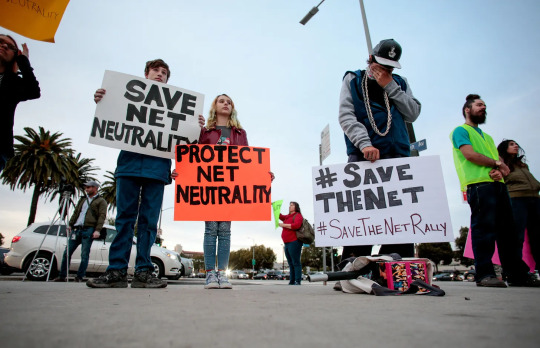
The U.S. Federal Communications Commission voted 3-2 on Thursday to reinstate landmark net neutrality rules and reassume regulatory oversight of broadband internet rescinded under former President Donald Trump.
2. Airlines required to refund passengers for canceled, delayed flights
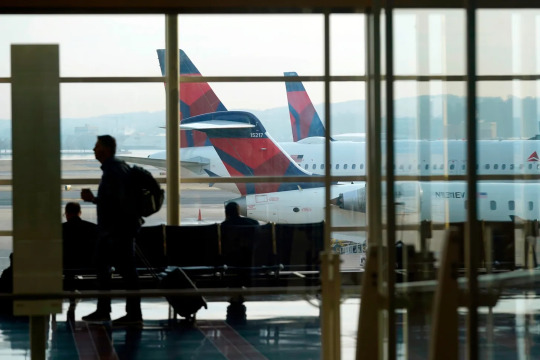
DOT will also require airlines to give cash refunds if your bags are lost and not delivered within 12 hours.
The refunds must be issued within seven days, according to the new DOT rules, and must be in cash unless the passenger chooses another form of compensation. Airlines can no longer issue refunds in forms of vouchers or credits when consumers are entitled to receive cash.
3. How new mosquito nets averted 13 million malaria cases

Compared to standard nets, the introduction of 56 million state-of-the-art mosquito nets in 17 countries across sub-Saharan Africa averted an estimated 13 million malaria cases and 24,600 deaths. The New Nets Project, an initiative funded by Unitaid and the Global Fund and led by the Innovative Vector Control Consortium (IVCC), piloted the use of dual-insecticide nets in malaria-endemic countries between 2019 and 2022 to address the growing threat of insecticide resistance.
4. Germany has installed over 400,000 ‘solar balconies’

This new wave of solar producers aren’t just getting cheap electricity, they’re also participating in the energy transition.
More than 400,000 plug-in solar systems have been installed in Germany, most of them taking up a seamless spot on people’s balconies.
5. Voyager-1 sends readable data again from deep space
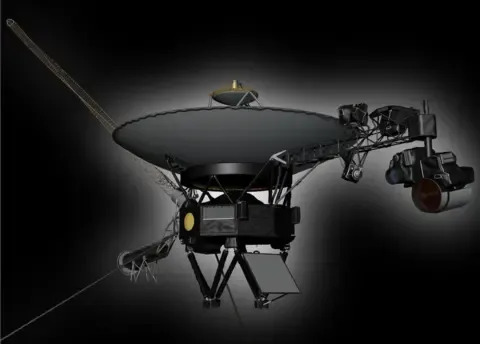
The US space agency says its Voyager-1 probe is once again sending usable information back to Earth after months of spouting gibberish.
The 46-year-old Nasa spacecraft is humanity's most distant object.
6. Missing cat found after 5 years makes 2,000-km journey home

Five years after it ran out the door, a lost cat was returned to a couple in Nevada after it was found thousands of kilometres away. The couple are praising the cat’s microchip for helping reunite them.
7. Restoring sight is possible now with optogenetics
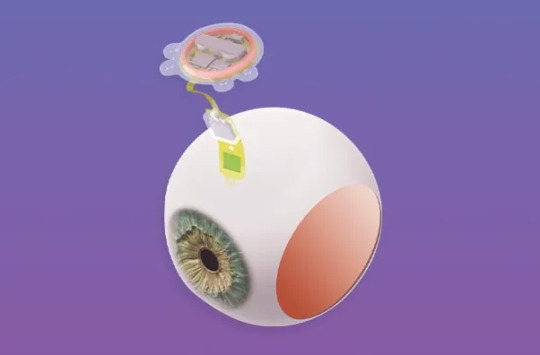
Max Hodak's startup, Science, is developing gene therapy solutions to restore vision for individuals with macular degeneration and similar conditions. The Science Eye utilizes optogenetics, injecting opsins into the eye to enhance light sensitivity in retinal cells.
Clinical trials and advancements in optogenetics are showing promising results, with the potential to significantly improve vision for those affected by retinal diseases.
---
That's it for this week :)
This newsletter will always be free. If you liked this post you can support me with a small kofi donation here:
Buy me a coffee ❤️
Also don’t forget to reblog this post with your friends.
652 notes
·
View notes
Quote
Boeing and its 737 are a textbook case. In October 2018 and March 2019, two crashes of an earlier version of the Max 737 killed 346 people, and grounded the planes for nearly two years. The disasters were ultimately traced to design failures in the model’s flight control software info that was not conveyed in its guidance to pilots, not to mention the Federal Aviation Administration, even though executives knew about it. Yet repercussions were almost nonexistent. A midlevel functionary charged criminally was acquitted by a jury in a matter of hours. It took the better part of a year — and two embarrassing days of congressional testimony — for Boeing to fire then-CEO Dennis Muhlenberg. The Trump administration ultimately decided to fine Boeing $2.5 billion for not informing the FAA about software changes that contributed to the fatal airline crashes, while deferring a criminal charge against the company. For Boeing, the fine effectively amounted to a business expense. The government even declared the company’s failure and misconduct “not pervasive,” a huge favor to a company facing massive lawsuits from victims’ families. Given this farcical excuse for accountability, it’s no surprise that the trouble didn’t stop for Boeing and the Max 737’s manufacturer, Spirit AeroSystems. The Lever reported Tuesday morning that a federal securities lawsuit filed last year against Spirit alleges “widespread and sustained quality failures,” including pressure on employees to downplay “defects.” And according to the Financial Times, last year Boeing itself flagged Spirit for improper installations and badly drilled holes on other 737s.
Boeing’s midair blowout is just a symptom of a much deeper rot
“For Boeing, the fine effectively amounted to a business expense.”
When I heard about this blowout on the 737, my first thought was, “this was caused by corporate greed and cutting corners, because Republicans have eviscerated accountability in corporate America.”
There is no satisfaction in learning that I am likely correct, just the grim knowledge that they’ll probably tighten some screws, but the rot at the core of the danger will be left untouched.
795 notes
·
View notes
Text
"Trump is better for the economy, though!"
Aside from almost every major economist agreeing that Trump's economic plans would actually make things far worse than they are now, this man can't even manage his campaign's, his businesses', OR his personal finances.
Case in point, here a list from Public Opinion of his failed business endeavors:
"Trump's companies have filed for bankruptcy at least six times. This is no exaggeration. Digital World noted this in its SEC filings. This excludes additional business failures that might not have declared bankruptcy, but closed owing vendors, employees and others."
"For the record, here are some of Trump's noteworthy business failures."
Trump Airlines — Trump borrowed $245 million to purchase Eastern Air Shuttle. He branded it Trump Airlines. He added gold bathroom fixtures. Two years later Trump could not cover the interest payment on his loan and defaulted.
Trump Beverages — Although Trump touted his water as "one of the purest natural spring waters bottled in the world," it was simply bottled by a third party. Other beverages, including Trump Fire and Trump Power, seem not to have made it to market. And Trump's American Pale Ale died with a trademark withdrawal.
Trump Game — Milton Bradley tried to sell it. As did Hasbro. After investment, the game died and went out of circulation.
Trump Casinos — Trump filed for bankruptcy three times on his casinos, namely the Trump Taj Mahal, the Trump Marina and the Trump Plaza in New Jersey and the Trump Casino in Indiana. Trump avoided debt obligations of $3 billion the first time. Then $1.8 billion the second time. And then after reorganizing, shuffling money and assets, and waiting four years, Trump again declared bankruptcy after missing ongoing interest payments on multi-million dollar bonds. He was finally forced to step down as chairman.
Trump Magazine — Trump Style and Trump World were renamed Trump Magazine to reap advertising dollars from his name recognition. However, Trump Magazine also went out of business.
Trump Mortgage — Trump told CNBC in 2006 that "I think it's a great time to start a mortgage company. … The real-estate market is going to be very strong for a long time to come." Then the real estate market collapsed. Trump had hired E.J. Ridings as CEO of Trump Mortgage and boasted that Ridings had been a "top executive of one of Wall Street's most prestigious investment banks." Turned out Ridings had only six months of experience as a stockbroker. Trump Mortgage closed and never paid a $298,274 judgment it owed a former employee, nor the $3,555 it owed in unpaid taxes.
Trump Steaks — Trump closed Trump Steaks due to a lack of sales while owing Buckhead Beef $715,000.
Trump's Travel Site — GoTrump.com was in business for one year. Failed.
Trumpnet — A telephone communication company that abandoned its trademark.
Trump Tower Tampa — Trump sold his name to the developers and received $2 million. Then the project went belly-up with only $3,500 left in the company. Condo buyers sued Trump for allegedly misleading them. Trump settled and paid as little as $11,115 to buyers who had lost hundreds of thousands of dollars.
Trump University or the Trump Entrepreneur Initiative — Trump staged wealth-building seminars costing up to $34,995 for mentorships that would offer students access to Trump's secrets of success. Instructors turned out to be motivational speakers sometimes with criminal records. Lawsuits and criminal investigations abound.
Trump Vodka — Business failed due to a lack of sales.
Trump Fragrances — Success by Trump, Empire by Trump, and Donald Trump: The Fragrances all failed due to being discontinued, perhaps as a result of few sales.
Trump Mattress — Serta stopped offering a Trump-branded mattress, again likely due to slacking sales.
Truth Social — This existing Trump business owes big money, and may well be breathing its last.
And then of course is his long history of stiffing contractors, restaurants, and even entire cities for their event venues he used for his rallies—as well as some of his own followers—
—such as the case where he promised a greiving hispanic American family that he would pay for the burial of their daughter, Vanessa Guillén, a servicewoman who had been brutally murdered by a fellow soldier at Fort Hood in 2020, but later told his chief of staff not to pay for it after learning it would cost $60,000, reportedly saying "It doesn’t cost 60,000 bucks to bury a fucking Mexican!"
108 notes
·
View notes
Text
Conspiratorialism and the epistemological crisis
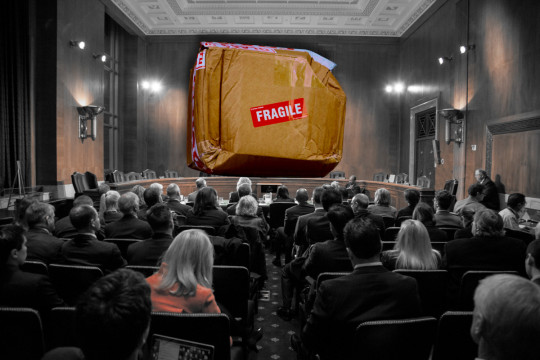
I'm on tour with my new, nationally bestselling novel The Bezzle! Catch me next weekend (Mar 30/31) in ANAHEIM at WONDERCON, then in Boston with Randall "XKCD" Munroe! (Apr 11), then Providence (Apr 12), and beyond!

Last year, Ed Pierson was supposed to fly from Seattle to New Jersey on Alaska Airlines. He boarded his flight, but then he had an urgent discussion with the flight attendant, explaining that as a former senior Boeing engineer, he'd specifically requested that flight because the aircraft wasn't a 737 Max:
https://www.cnn.com/travel/boeing-737-max-passenger-boycott/index.html
But for operational reasons, Alaska had switched out the equipment on the flight and there he was on a 737 Max, about to travel cross-continent, and he didn't feel safe doing so. He demanded to be let off the flight. His bags were offloaded and he walked back up the jetbridge after telling the spooked flight attendant, "I can’t go into detail right now, but I wasn’t planning on flying the Max, and I want to get off the plane."
Boeing, of course, is a flying disaster that was years in the making. Its planes have been falling out of the sky since 2019. Floods of whistleblowers have come forward to say its aircraft are unsafe. Pierson's not the only Boeing employee to state – both on and off the record – that he wouldn't fly on a specific model of Boeing aircraft, or, in some cases any recent Boeing aircraft:
https://pluralistic.net/2024/01/22/anything-that-cant-go-on-forever/#will-eventually-stop
And yet, for years, Boeing's regulators have allowed the company to keep turning out planes that keep turning out lemons. This is a pretty frightening situation, to say the least. I'm not an aerospace engineer, I'm not an aircraft safety inspector, but every time I book a flight, I have to make a decision about whether to trust Boeing's assurances that I can safely board one of its planes without dying.
In an ideal world, I wouldn't even have to think about this. I'd be able to trust that publicly accountable regulators were on the job, making sure that airplanes were airworthy. "Caveat emptor" is no way to run a civilian aviation system.
But even though I don't have the specialized expertise needed to assess the airworthiness of Boeing planes, I do have the much more general expertise needed to assess the trustworthiness of Boeing's regulator. The FAA has spent years deferring to Boeing, allowing it to self-certify that its aircraft were safe. Even when these assurances led to the death of hundreds of people, the FAA continued to allow Boeing to mark its own homework:
https://www.youtube.com/watch?v=Q8oCilY4szc
What's more, the FAA boss who presided over those hundreds of deaths was an ex-Boeing lobbyist, whom Trump subsequently appointed to run Boeing's oversight. He's not the only ex-insider who ended up a regulator, and there's plenty of ex-regulators now on Boeing's payroll:
https://therevolvingdoorproject.org/boeing-debacle-shows-need-to-investigate-trump-era-corruption/
You don't have to be an aviation expert to understand that companies have conflicts of interest when it comes to certifying their own products. "Market forces" aren't going to keep Boeing from shipping defective products, because the company's top brass are more worried about cashing out with this quarter's massive stock buybacks than they are about their successors' ability to manage the PR storm or Congressional hearings after their greed kills hundreds and hundreds of people.
You also don't have to be an aviation expert to understand that these conflicts persist even when a Boeing insider leaves the company to work for its regulators, or vice-versa. A regulator who anticipates a giant signing bonus from Boeing after their term in office, or a an ex-Boeing exec who holds millions in Boeing stock has an irreconcilable conflict of interest that will make it very hard – perhaps impossible – for them to hold the company to account when it trades safety for profit.
It's not just Boeing customers who feel justifiably anxious about trusting a system with such obvious conflicts of interest: Boeing's own executives, lobbyists and lawyers also refuse to participate in similarly flawed systems of oversight and conflict resolution. If Boeing was sued by its shareholders and the judge was also a pissed off Boeing shareholder, they would demand a recusal. If Boeing was looking for outside counsel to represent it in a liability suit brought by the family of one of its murder victims, they wouldn't hire the firm that was suing them – not even if that firm promised to be fair. If a Boeing executive's spouse sued for divorce, that exec wouldn't use the same lawyer as their soon-to-be-ex.
Sure, it takes specialized knowledge and training to be a lawyer, a judge, or an aircraft safety inspector. But anyone can look at the system those experts work in and spot its glaring defects. In other words, while acquiring expertise is hard, it's much easier to spot weaknesses in the process by which that expertise affects the world around us.
And therein lies the problem: aviation isn't the only technically complex, potentially lethal, and utterly, obviously untrustworthy system we all have to navigate. How about the building safety codes that governed the structure you're in right now? Plenty of people have blithely assumed that structural engineers carefully designed those standards, and that these standards were diligently upheld, only to discover in tragic, ghastly ways that this was wrong:
https://www.bbc.com/news/64568826
There are dozens – hundreds! – of life-or-death, highly technical questions you have to resolve every day just to survive. Should you trust the antilock braking firmware in your car? How about the food hygiene rules in the factories that produced the food in your shopping cart? Or the kitchen that made the pizza that was just delivered? Is your kid's school teaching them well, or will they grow up to be ignoramuses and thus economic roadkill?
Hell, even if I never get into another Boeing aircraft, I live in the approach path for Burbank airport, where Southwest lands 50+ Boeing flights every day. How can I be sure that the next Boeing 737 Max that falls out of the sky won't land on my roof?
This is the epistemological crisis we're living through today. Epistemology is the process by which we know things. The whole point of a transparent, democratically accountable process for expert technical deliberation is to resolve the epistemological challenge of making good choices about all of these life-or-death questions. Even the smartest person among us can't learn to evaluate all those questions, but we can all look at the process by which these questions are answered and draw conclusions about its soundness.
Is the process public? Are the people in charge of it forthright? Do they have conflicts of interest, and, if so, do they sit out any decision that gives even the appearance of impropriety? If new evidence comes to light – like, say, a horrific disaster – is there a way to re-open the process and change the rules?
The actual technical details might be a black box for us, opaque and indecipherable. But the box itself can be easily observed: is it made of sturdy material? Does it have sharp corners and clean lines? Or is it flimsy, irregular and torn? We don't have to know anything about the box's contents to conclude that we don't trust the box.
For example: we may not be experts in chemical engineering or water safety, but we can tell when a regulator is on the ball on these issues. Back in 2019, the West Virginia Department of Environmental Protection sought comment on its water safety regs. Dow Chemical – the largest corporation in the state's largest industry – filed comments arguing that WV should have lower standards for chemical contamination in its drinking water.
Now, I'm perfectly prepared to believe that there are safe levels of chemical runoff in the water supply. There's a lot of water in the water supply, after all, and "the dose makes the poison." What's more, I use the products whose manufacture results in that chemical waste. I want them to be made safely, but I do want them to be made – for one thing, the next time I have surgery, I want the anesthesiologist to start an IV with fresh, sterile plastic tubing.
And I'm not a chemist, let alone a water chemist. Neither am I a toxicologist. There are aspects of this debate I am totally unqualified to assess. Nevertheless, I think the WV process was a bad one, and here's why:
https://www.wvma.com/press/wvma-news/4244-wvma-statement-on-human-health-criteria-development
That's Dow's comment to the regulator (as proffered by its mouthpiece, the WV Manufacturers' Association, which it dominates). In that comment, Dow argues that West Virginians safely can absorb more poison than other Americans, because the people of West Virginia are fatter than other Americans, and so they have more tissue and thus a better ratio of poison to person than the typical American. But they don't stop there! They also say that West Virginians don't drink as much water as their out-of-state cousins, preferring to drink beer instead, so even if their water is more toxic, they'll be drinking less of it:
https://washingtonmonthly.com/2019/03/14/the-real-elitists-looking-down-on-trump-voters/
Even without any expertise in toxicology or water chemistry, I can tell that these are bullshit answers. The fact that the WV regulator accepted these comments tells me that they're not a good regulator. I was in WV last year to give a talk, and I didn't drink the tap water.
It's totally reasonable for non-experts to reject the conclusions of experts when the process by which those experts resolve their disagreements is obviously corrupt and irredeemably flawed. But some refusals carry higher costs – both for the refuseniks and the people around them – than my switching to bottled water when I was in Charleston.
Take vaccine denial (or "hesitancy"). Many people greeted the advent of an extremely rapid, high-tech covid vaccine with dread and mistrust. They argued that the pharma industry was dominated by corrupt, greedy corporations that routinely put their profits ahead of the public's safety, and that regulators, in Big Pharma's pocket, let them get away with mass murder.
The thing is, all that is true. Look, I've had five covid vaccinations, but not because I trust the pharma industry. I've had direct experience of how pharma sacrifices safety on greed's altar, and narrowly avoided harm myself. I have had chronic pain problems my whole life, and they've gotten worse every year. When my daughter was on the way, I decided this was going to get in the way of my ability to parent – I wanted to be able to carry her for long stretches! – and so I started aggressively pursuing the pain treatments I'd given up on many years before.
My journey led me to many specialists – physios, dieticians, rehab specialists, neurologists, surgeons – and I tried many, many therapies. Luckily, my wife had private insurance – we were in the UK then – and I could go to just about any doctor that seemed promising. That's how I found myself in the offices of a Harley Street quack, a prominent pain specialist, who had great news for me: it turned out that opioids were way safer than had previously been thought, and I could just take opioids every day and night for the rest of my life without any serious risk of addiction. It would be fine.
This sounded wrong to me. I'd lost several friends to overdoses, and watched others spiral into miserable lives as they struggled with addiction. So I "did my own research." Despite not having a background in chemistry, biology, neurology or pharmacology, I struggled through papers and read commentary and came to the conclusion that opioids weren't safe at all. Rather, corrupt billionaire pharma owners like the Sackler family had colluded with their regulators to risk the lives of millions by pushing falsified research that was finding publication in some of the most respected, peer-reviewed journals in the world.
I became an opioid denier, in other words.
I decided, based on my own research, that the experts were wrong, and that they were wrong for corrupt reasons, and that I couldn't trust their advice.
When anti-vaxxers decried the covid vaccines, they said things that were – in form at least – indistinguishable from the things I'd been saying 15 years earlier, when I decided to ignore my doctor's advice and throw away my medication on the grounds that it would probably harm me.
For me, faith in vaccines didn't come from a broad, newfound trust in the pharmaceutical system: rather, I judged that there was so much scrutiny on these new medications that it would overwhelm even pharma's ability to corruptly continue to sell a medication that they secretly knew to be harmful, as they'd done so many times before:
https://www.npr.org/2007/11/10/5470430/timeline-the-rise-and-fall-of-vioxx
But many of my peers had a different take on anti-vaxxers: for these friends and colleagues, anti-vaxxers were being foolish. Surprisingly, these people I'd long felt myself in broad agreement with began to defend the pharmaceutical system and its regulators. Once they saw that anti-vaxx was a wedge issue championed by right-wing culture war shitheads, they became not just pro-vaccine, but pro-pharma.
There's a name for this phenomenon: "schismogenesis." That's when you decide how you feel about an issue based on who supports it. Think of self-described "progressives" who became cheerleaders for the America's cruel, ruthless and lawless "intelligence community" when it seemed that US spooks were bent on Trump's ouster:
https://pluralistic.net/2021/12/18/schizmogenesis/
The fact that the FBI didn't like Trump didn't make them allies of progressive causes. This was and is the same entity that (among other things) tried to blackmail Martin Luther King, Jr into killing himself:
https://en.wikipedia.org/wiki/FBI%E2%80%93King_suicide_letter
But schismogenesis isn't merely a reactionary way of flip-flopping on issues based on reflexive enmity. It's actually a reasonable epistemological tactic: in a world where there are more issues you need to be clear on than you can possibly inform yourself about, you need some shortcuts. One shortcut – a shortcut that's failing – is to say, "Well, I'll provisionally believe whatever the expert system tells me is true." Another shortcut is, "I will provisionally disbelieve in whatever the people I know to act in bad faith are saying is true." That is, "schismogenesis."
Schismogenesis isn't a great tactic. It would be far better if we had a set of institutions we could all largely trust – if the black boxes where expert debate took place were sturdy, rectilinear and sharp-cornered.
But they're not. They're just not. Our regulatory process sucks. Corporate concentration makes it trivial for cartels to capture their regulators and steer them to conclusions that benefit corporate shareholders even if that means visiting enormous harm – even mass death – on the public:
https://pluralistic.net/2022/06/05/regulatory-capture/
No one hates Big Tech more than I do, but many of my co-belligerents in the war on Big Tech believe that the rise of conspiratorialism can be laid at tech platforms' feet. They say that Big Tech boasts of how good they are at algorithmically manipulating our beliefs, and attribute Qanons, flat earthers, and other outlandish conspiratorial cults to the misuse off those algorithms.
"We built a Big Data mind-control ray" is one of those extraordinary claims that requires extraordinary evidence. But the evidence for Big Tech's persuasion machines is very poor: mostly, it consists of tech platforms' own boasts to potential investors and customers for their advertising products. "We can change peoples' minds" has long been the boast of advertising companies, and it's clear that they can change the minds of customers for advertising.
Think of department store mogul John Wanamaker, who famously said "Half the money I spend on advertising is wasted; the trouble is I don't know which half." Today – thanks to commercial surveillance – we know that the true proportion of wasted advertising spending is more like 99.9%. Advertising agencies may be really good at convincing John Wanamaker and his successors, through prolonged, personal, intense selling – but that doesn't mean they're able to sell so efficiently to the rest of us with mass banner ads or spambots:
http://pluralistic.net/HowToDestroySurveillanceCapitalism
In other words, the fact that Facebook claims it is really good at persuasion doesn't mean that it's true. Just like the AI companies who claim their chatbots can do your job: they are much better at convincing your boss (who is insatiably horny for firing workers) than they are at actually producing an algorithm that can replace you. What's more, their profitability relies far more on convincing a rich, credulous business executive that their product works than it does on actually delivering a working product.
Now, I do think that Facebook and other tech giants play an important role in the rise of conspiratorial beliefs. However, that role isn't using algorithms to persuade people to mistrust our institutions. Rather Big Tech – like other corporate cartels – has so corrupted our regulatory system that they make trusting our institutions irrational.
Think of federal privacy law. The last time the US got a new federal consumer privacy law was in 1988, when Congress passed the Video Privacy Protection Act, a law that prohibits video store clerks from leaking your VHS rental history:
https://www.eff.org/deeplinks/2008/07/why-vppa-protects-youtube-and-viacom-employees
It's been a minute. There are very obvious privacy concerns haunting Americans, related to those tech giants, and yet the closest Congress can come to doing something about it is to attempt the forced sale of the sole Chinese tech giant with a US footprint to a US company, to ensure that its rampant privacy violations are conducted by our fellow Americans, and to force Chinese spies to buy their surveillance data on millions of Americans in the lawless, reckless swamp of US data-brokerages:
https://www.npr.org/2024/03/14/1238435508/tiktok-ban-bill-congress-china
For millions of Americans – especially younger Americans – the failure to pass (or even introduce!) a federal privacy law proves that our institutions can't be trusted. They're right:
https://www.tiktok.com/@pearlmania500/video/7345961470548512043
Occam's Razor cautions us to seek the simplest explanation for the phenomena we see in the world around us. There's a much simpler explanation for why people believe conspiracy theories they encounter online than the idea that the one time Facebook is telling the truth is when they're boasting about how well their products work – especially given the undeniable fact that everyone else who ever claimed to have perfected mind-control was a fantasist or a liar, from Rasputin to MK-ULTRA to pick-up artists.
Maybe people believe in conspiracy theories because they have hundreds of life-or-death decisions to make every day, and the institutions that are supposed to make that possible keep proving that they can't be trusted. Nevertheless, those decisions have to be made, and so something needs to fill the epistemological void left by the manifest unsoundness of the black box where the decisions get made.
For many people – millions – the thing that fills the black box is conspiracy fantasies. It's true that tech makes finding these conspiracy fantasies easier than ever, and it's true that tech makes forming communities of conspiratorial belief easier, too. But the vulnerability to conspiratorialism that algorithms identify and target people based on isn't a function of Big Data. It's a function of corruption – of life in a world in which real conspiracies (to steal your wages, or let rich people escape the consequences of their crimes, or sacrifice your safety to protect large firms' profits) are everywhere.
Progressives – which is to say, the coalition of liberals and leftists, in which liberals are the senior partners and spokespeople who control the Overton Window – used to identify and decry these conspiracies. But as right wing "populists" declared their opposition to these conspiracies – when Trump damned free trade and the mainstream media as tools of the ruling class – progressives leaned into schismogenesis and declared their vocal support for these old enemies of progress.
This is the crux of Naomi Klein's brilliant 2023 book Doppelganger: that as the progressive coalition started supporting these unworthy and broken institutions, the right spun up "mirror world" versions of their critique, distorted versions that focus on scapegoating vulnerable groups rather than fighting unworthy institutions:
https://pluralistic.net/2023/09/05/not-that-naomi/#if-the-naomi-be-klein-youre-doing-just-fine
This is a long tradition in politics: hundreds of years ago, some leftists branded antisemitism "the socialism of fools." Rather than condemning the system's embrace of the finance sector and its wealthy beneficiaries, anti-semites blame a disfavored group of people – people who are just as likely as anyone to suffer under the system:
https://en.wikipedia.org/wiki/Antisemitism_is_the_socialism_of_fools
It's an ugly, shallow, cartoon version of socialism's measured and comprehensive analysis of how the class system actually works and why it's so harmful to everyone except a tiny elite. Literally cartoonish: the shadow-world version of socialism co-opts and simplifies the iconography of class struggle. And schismogenesis – "if the right likes this, I don't" – sends "progressive" scolds after anyone who dares to criticize finance as the crux of our world's problems as popularizing "antisemetic dog-whistles."
This is the problem with "horseshoe theory" – the idea that the far right and the far left bend all the way around to meet each other:
https://pluralistic.net/2024/02/26/horsehoe-crab/#substantive-disagreement
When the right criticizes pharma companies, they tell us to "do our own research" (e.g. ignore the systemic problems of people being forced to work under dangerous conditions during a pandemic while individually assessing conflicting claims about vaccine safety, ideally landing on buying "supplements" from a grifter). When the left criticizes pharma, it's to argue for universal access to medicine and vigorous public oversight of pharma companies. These aren't the same thing:
https://pluralistic.net/2021/05/25/the-other-shoe-drops/#quid-pro-quo
Long before opportunistic right wing politicians realized they could get mileage out of pointing at the terrifying epistemological crisis of trying to make good choices in an age of institutions that can't be trusted, the left was sounding the alarm. Conspiratorialism – the fracturing of our shared reality – is a serious problem, weakening our ability to respond effectively to endless disasters of the polycrisis.
But by blaming the problem of conspiratorialism on the credulity of believers (rather than the deserved disrepute of the institutions they have lost faith in) we adopt the logic of the right: "conspiratorialism is a problem of individuals believing wrong things," rather than "a system that makes wrong explanations credible – and a schismogenic insistence that these institutions are sound and trustworthy."

If you'd like an essay-formatted version of this post to read or share, here's a link to it on pluralistic.net, my surveillance-free, ad-free, tracker-free blog:
https://pluralistic.net/2024/03/25/black-boxes/#when-you-know-you-know

Image: Nuclear Regulatory Commission (modified) https://www.flickr.com/photos/nrcgov/15993154185/
meanwell-packaging.co.uk https://www.flickr.com/photos/195311218@N08/52159853896
CC BY 2.0 https://creativecommons.org/licenses/by/2.0/
#pluralistic#conspiratorialism#epistemology#epistemological crisis#mind control rays#opioid denial#vaccine denial#regulatory capture#boeing#corruption#inequality#monopoly#apple#dma#eu
297 notes
·
View notes